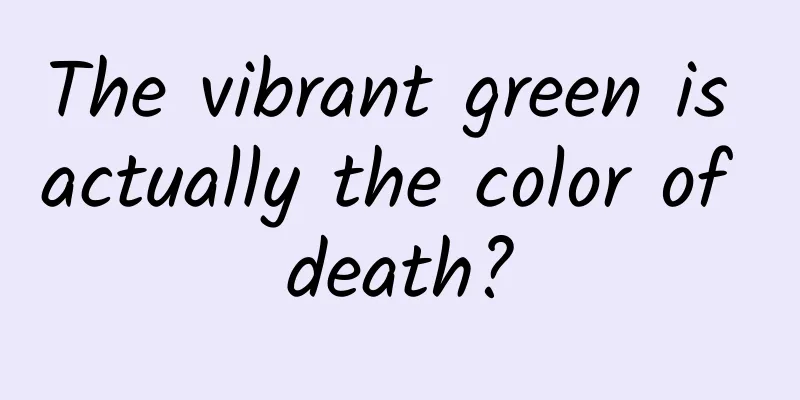The vibrant green is actually the color of death?

|
This painting, in bright green, makes the whole room look vibrant. (Embroiderer Georg Friedrich Kersting 1812) However, the green in these two paintings is the color of death. This green is called Scherrer Green, which was invented by chemist Carl Scherrer in 1775. Based on it, people developed Paris Green. The structures of these two greens are similar, and they are also very bright and more durable. Once they came out, they replaced the previous dull copper carbonate pigment. People at that time were deeply conquered by this green color. Girls wore Scheele green skirts to show their vitality. People also added Scheerer Green and Paris Green to their wallpapers and children's toys, hoping to bring green nature home. Even Napoleon, when he was imprisoned on St. Helena, painted the walls of his room bright green, hoping that he could be as full of spring as this green. But the wallpaper did not bring vitality to Napoleon. There is a saying that Napoleon's death was related to the arsenic in the wallpaper. The autopsy results of Napoleon found that arsenic was detected in his hair. Scientists speculate that Napoleon inhaled too much arsenic in the room, which may have caused his death. Of course, Napoleon was not the only one who suffered. Green betrayed many people. The girl in the green dress did not become more energetic, but drowsy. People whose homes were covered with green wallpaper began to have health problems, especially in winter, when people were more likely to suffer from various physical discomforts in closed rooms. A female worker who painted leaves died of poisoning due to this paint. There was also a child named Ann Amelia Turner who died of poisoning because she ate wallpaper torn off the wall out of curiosity. People began to realize that this green was poisonous and could no longer be used, so Scheerer Green and Paris Green gradually disappeared from people's walls and portraits. However, this national poisoning incident left a huge shadow on people's minds. The use of green to represent poison in games may have been influenced by this incident. Before these two pigments were banned, some people added them to French panna cotta, so that they could eat the color of life in one bite. Now think about it, it seems like eating your own life in one bite. However, Scheerer's Green and Paris Green did not disappear. Soon, they reappeared. But this time, they were not used as pigments, but as insecticides. In 1868, Americans used it to kill pests that ate potatoes. Until around World War II, the British and Americans were still using Paris Green to kill mosquitoes and control malaria. Kill mosquitoes with Paris Green The article is produced by Science Popularization China-Starry Sky Project (Creation and Cultivation). Please indicate the source when reprinting. Author: Science scraps popular science team Reviewer: Wu Yongming, Senior Engineer of Analytical Chemistry, University of Science and Technology Beijing |
<<: Understand the latest developments in AI in one article! A guide for workers →
Recommend
The efficacy and function of money tree root
Do you know about the root of the money tree? It ...
The efficacy and function of Pine
Pine is a traditional Chinese medicine. In additi...
The efficacy and function of Sedum sedum
Traditional Chinese medicine is a Chinese traditi...
When it comes to obesity, boys are more concerned than girls! It makes sense...
According to statistics from the World Health Org...
Can prolonged use of mobile phones cause cerebral infarction? These habits are no joke!
Expert of this article: Wang Li, attending physic...
It’s not wrong to want to “lie down”, the “lazy cancer gene” is innate!
Reviewer: Ji Shi Life Field Observer A quarter of...
What are the magical effects of Prunella vulgaris
Prunella vulgaris, also known as wire grass Prune...
Movies and TV shows show people vomiting blood in various ways... Is it really reasonable?
An actor's self-cultivation includes not only...
The temperature is too high, do you need to rely on air conditioning to "keep alive"? Be careful of these "air conditioning diseases"!
In summer, the temperature remains high. Many peo...
The full-face photo of the world's only wild white giant panda has been released. The dark circles under its eyes seem to have been "Photoshopped out". What is the reason for its rare fur color?
Xinhua News Agency reported that on May 27, the S...
The efficacy and function of Si Shi Qing
Do you know about Si Shi Qing? It is a common med...
Facing disaster
Smiling Georgia medical volunteers made a "h...
Humans eat this kind of food, causing male fish to change sex, birds to become extinct, and causing chaos in the animal world
In recent years, a mysterious phenomenon has been...
How to eat wild black wolfberry
There is a certain difference between wild black ...






![The efficacy and function of Longchangcao [picture]](/upload/images/67ca3f9a64779.webp)


![The efficacy and function of Yi Dian Hong [picture]](/upload/images/67ca1fd1cd6b4.webp)